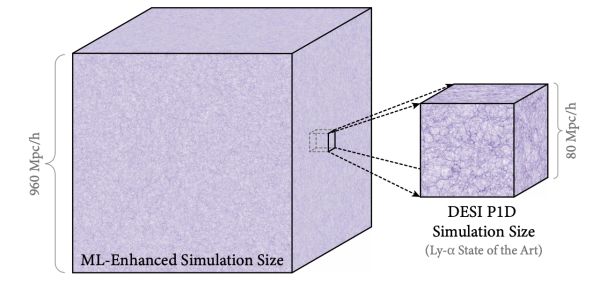Reconstructing Lyα Fields from Low-resolution Hydrodynamical Simulations with Deep Learning

A collaboration between NERSC and LBNL cosmologists has introduced an innovative deep learning approach that overcomes limitations of traditional hydrodynamical simulations of the lyman-alpha forest. By combining physics-driven simulations with generative neural networks, the approach is capable of producing outputs comparable to simulations with eight times higher resolution. This leap in resolution is achieved without the immense computational resources typically required, enabling accurate representations of small-scale density fluctuations in the intergalactic medium (IGM) which are critical to capturing qualitative and quantitative details of the lyman-alpha forest, which can be compared against observations. A key advancement is the model's ability to generate multiple realizations from the same input, providing a measure of uncertainty that correlates well with actual prediction errors. This method allows for training on smaller simulation volumes while scaling to much larger ones, such as those probed by upcoming surveys like DESI, including up to the scale of Gigaparsecs. The result is a significant improvement in our ability to model the large-scale structure of the universe, providing deeper insights into the physics shaping cosmic matter distribution. This work paves the way for future applications in upcoming spectroscopic sky surveys, offering more accurate comparisons between observed and simulated cosmic structures.
For more information, see the paper at https://doi.org/10.3847/1538-4357/acfcb5
About NERSC and Berkeley Lab
The National Energy Research Scientific Computing Center (NERSC) is a U.S. Department of Energy Office of Science User Facility that serves as the primary high performance computing center for scientific research sponsored by the Office of Science. Located at Lawrence Berkeley National Laboratory, NERSC serves almost 10,000 scientists at national laboratories and universities researching a wide range of problems in climate, fusion energy, materials science, physics, chemistry, computational biology, and other disciplines. Berkeley Lab is a DOE national laboratory located in Berkeley, California. It conducts unclassified scientific research and is managed by the University of California for the U.S. Department of Energy. »Learn more about computing sciences at Berkeley Lab.







